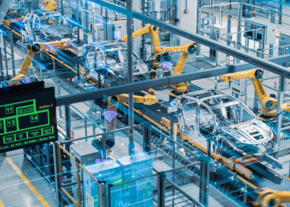
The Global race towards innovation
Guido Gambassi
Interview with AICA’s President Mauro Severi. One of Italy’s industrial crown jewels looks to the challenges ahead
In a period of economic instability, much like the one Italy has been going through for some years now and which seems destined to last, the workshop equipment sector maintains its role as one of the cornerstones of Italy’s manufacturing scenario. An industrial excellence recognized all over the world, confirming our country as the second largest European manufacturing powerhouse and the Made in Italy logo as a synonym of quality and innovation. It comes as no surprise then that at the next edition of Autopromotec, which takes place in Bologna from May 22 to 26, this sector will take the lion's share, with about 500 companies showcasing their new products and ground-breaking technologies. We spoke to Mauro Severi, president of AICA – Italian Garage Equipment Manufacturers’ Association – about the current issues facing the sector as well as future scenarios.
President Severi, at a time characterized by a relentless technological drive, is the garage equipment sector still playing a leading role in Italy’s industrial scenario and the automotive sector?
"Without any doubt, our companies have long been committed to the profound technological upgrade currently re-shaping the identity of the aftermarket. A true global mission seeing that many associated companies export more than 80% of their production. Therefore, our contribution is not only significant as far as the National trade balance is concerned, our ability to promptly adapt new technologies and digital solutions to our equipment and services, is setting new standards".
Global dimensions, new technologies and automotive, you are undoubtedly enjoying a rather privileged point of view.
"Being at home in the world market is a rather difficult exercise, one that cannot be improvised. It means bearing the brunt of all the repercussions produced by technological, geo-political, financial dynamics as well as trade wars. All this becomes even more important for those who, like us, are active within the automotive sector, which is being literally transformed by a digital revolution and the challenges of a sustainable mobility. I can safely say that our companies are experiencing a three-fold digital revolution: first, one that is affecting our production facilities, second concerning our products, third and last, is related to the players in the automotive industry, primarily manufacturers and after market operators, all of which must now be 'connected'”.
You referred to trade wars and I imagine you were referring to the one now in progress.
"There is no doubt that a trade war is being fought on a global scale with no-holds barred. To understand the reasons, one just needs to consult the latest report by Acea (European Automobile Manufacturers' Association) to discover that in Europe the automotive industry employs, directly and indirectly, 3.4 million workers, produces 23 million vehicles every year with a trade surplus of 90.3 billion euro. If we project these figures on the background of the tensions now existing between the European Union and the United States, and between the latter and China, we realize just how much government decisions can affect the industrial development of entire macro-areas and how urgent it is to determine what kind of future do we want for our industry.
However, other factors are equally affecting global trade.
"True, global trade is undergoing significant changes. On closer look, it is the very nature of globalization that is evolving. Although the production and trading of goods continues to grow in absolute terms, the percentage of goods traded compared to the amount of goods produced is decreasing. According to the McKinsey Global Institute, this percentage was 28% in 2007, ten years later, in 2017, it fell to 22.5%. On the other hand, services are playing an increasingly crucial role in value creation. Over the last decade, trade in services has grown 60% faster than trade in goods.
Hence, this growth of "trade in services" does not only concern hi-tech products, but also mechanical engineering and mechatronics in general?
"Of course, in a not too distant future, the distinction between product and service will continue to fade because all manufacturing sectors are adopting new business models based on services, with a great deal of implications. This means, for example, that know-how and other intangible elements will acquire an increasingly vital role. An evolutionary process that will favour countries with a more skilled workforce, a strong vocation for innovation, research and development, and with effective systems for protecting intellectual property.
What sort of impact can we expect from changes in mobility patterns? Will autonomous driving really be so disruptive?
"The fact that the annual consumer electronics fair in Las Vegas, the CES, is becoming a big event for car-makers around the world, is a clear indication that we are entering a new phase. In any case, I am quite sure that the mass spread of a radical innovation such as autonomous vehicles is bound to be introduced very gradually and over a considerable amount of time.
How do you view the sudden surge recorded by hybrid and electric vehicles?
"Authoritative sources estimate that, worldwide, electric vehicles will account for 17% of all car sales by 2030 (they made up just 1% in 2017). This will reduce by up to 10% current trade in components.
Digital revolution, autonomous driving, electricity; what about diagnostics?
"In this field, and I must say that here AICA can boast great expertise, the MarketsandMarkets research company expects a global turnover growth of 41% by 2025. This growth represents a real challenge/opportunity for companies, operators as well as AICA".
Mr Severi, in all this where does road haulage fit?
"Road haulage is probably one of the sectors that receives the least amount of attention. A sorry state of affairs not only because of the economic and occupational significance of the sector, but also because we are losing sight of the crucial role that road haulage has in keeping the country ticking over. This sector still has far too many unresolved issues, which means that dedicated policies, and measures, are indispensable and urgent".
What about sustainability?
"We run the risk that, as marketing focuses on the mobility of the future, old problems will remain unresolved. I am referring to issues such as the reuse, recycling and disposal of end-of-life vehicles. Issues like these must be placed on the table because sustainability is not just "zero emission" mobility, but a systemic approach, one that affects and involves everyone and everything".
Considering all these new elements, is AICA thinking to update its Mission?
"It couldn't be otherwise. For some time now, we have been actively monitoring a number of issues such as connectivity, access to software and proprietary platform standards. At the same time, AICA has started a globalization process that has led to the creation of a dense network of relationships. Finally, I would like to point out AICA's greater commitment to lobbying initiatives aimed at institutional decision-makers. It is an increasingly important activity because there is a gap that is forming between the companies that are driving the transformations of mobility and those who are called upon to decide on regulatory frameworks, industrial policies, investments in infrastructures and scientific research".
Policies and investments that are certainly lacking in Italy.
"True, and this explains the redefinition of AICA’s mission previously mentioned. It's a recurring short-sightedness in our country: we only see the negative side of new developments, thus failing to capitalize on the opportunities that these always bring along with them. One such opportunity, and one not to be missed, relates to the requalification of all the "trades" linked to the aftermarket. New cars are a world apart from the vehicles we are accustomed to. Today we need "mechatronics" with new digital skills. All of this contributes to the creation of new "trades" which can represent a concrete job opportunity for many young people".
President Severi, at a time characterized by a relentless technological drive, is the garage equipment sector still playing a leading role in Italy’s industrial scenario and the automotive sector?
"Without any doubt, our companies have long been committed to the profound technological upgrade currently re-shaping the identity of the aftermarket. A true global mission seeing that many associated companies export more than 80% of their production. Therefore, our contribution is not only significant as far as the National trade balance is concerned, our ability to promptly adapt new technologies and digital solutions to our equipment and services, is setting new standards".
Global dimensions, new technologies and automotive, you are undoubtedly enjoying a rather privileged point of view.
"Being at home in the world market is a rather difficult exercise, one that cannot be improvised. It means bearing the brunt of all the repercussions produced by technological, geo-political, financial dynamics as well as trade wars. All this becomes even more important for those who, like us, are active within the automotive sector, which is being literally transformed by a digital revolution and the challenges of a sustainable mobility. I can safely say that our companies are experiencing a three-fold digital revolution: first, one that is affecting our production facilities, second concerning our products, third and last, is related to the players in the automotive industry, primarily manufacturers and after market operators, all of which must now be 'connected'”.
You referred to trade wars and I imagine you were referring to the one now in progress.
"There is no doubt that a trade war is being fought on a global scale with no-holds barred. To understand the reasons, one just needs to consult the latest report by Acea (European Automobile Manufacturers' Association) to discover that in Europe the automotive industry employs, directly and indirectly, 3.4 million workers, produces 23 million vehicles every year with a trade surplus of 90.3 billion euro. If we project these figures on the background of the tensions now existing between the European Union and the United States, and between the latter and China, we realize just how much government decisions can affect the industrial development of entire macro-areas and how urgent it is to determine what kind of future do we want for our industry.
However, other factors are equally affecting global trade.
"True, global trade is undergoing significant changes. On closer look, it is the very nature of globalization that is evolving. Although the production and trading of goods continues to grow in absolute terms, the percentage of goods traded compared to the amount of goods produced is decreasing. According to the McKinsey Global Institute, this percentage was 28% in 2007, ten years later, in 2017, it fell to 22.5%. On the other hand, services are playing an increasingly crucial role in value creation. Over the last decade, trade in services has grown 60% faster than trade in goods.
Hence, this growth of "trade in services" does not only concern hi-tech products, but also mechanical engineering and mechatronics in general?
"Of course, in a not too distant future, the distinction between product and service will continue to fade because all manufacturing sectors are adopting new business models based on services, with a great deal of implications. This means, for example, that know-how and other intangible elements will acquire an increasingly vital role. An evolutionary process that will favour countries with a more skilled workforce, a strong vocation for innovation, research and development, and with effective systems for protecting intellectual property.
What sort of impact can we expect from changes in mobility patterns? Will autonomous driving really be so disruptive?
"The fact that the annual consumer electronics fair in Las Vegas, the CES, is becoming a big event for car-makers around the world, is a clear indication that we are entering a new phase. In any case, I am quite sure that the mass spread of a radical innovation such as autonomous vehicles is bound to be introduced very gradually and over a considerable amount of time.
How do you view the sudden surge recorded by hybrid and electric vehicles?
"Authoritative sources estimate that, worldwide, electric vehicles will account for 17% of all car sales by 2030 (they made up just 1% in 2017). This will reduce by up to 10% current trade in components.
Digital revolution, autonomous driving, electricity; what about diagnostics?
"In this field, and I must say that here AICA can boast great expertise, the MarketsandMarkets research company expects a global turnover growth of 41% by 2025. This growth represents a real challenge/opportunity for companies, operators as well as AICA".
Mr Severi, in all this where does road haulage fit?
"Road haulage is probably one of the sectors that receives the least amount of attention. A sorry state of affairs not only because of the economic and occupational significance of the sector, but also because we are losing sight of the crucial role that road haulage has in keeping the country ticking over. This sector still has far too many unresolved issues, which means that dedicated policies, and measures, are indispensable and urgent".
What about sustainability?
"We run the risk that, as marketing focuses on the mobility of the future, old problems will remain unresolved. I am referring to issues such as the reuse, recycling and disposal of end-of-life vehicles. Issues like these must be placed on the table because sustainability is not just "zero emission" mobility, but a systemic approach, one that affects and involves everyone and everything".
Considering all these new elements, is AICA thinking to update its Mission?
"It couldn't be otherwise. For some time now, we have been actively monitoring a number of issues such as connectivity, access to software and proprietary platform standards. At the same time, AICA has started a globalization process that has led to the creation of a dense network of relationships. Finally, I would like to point out AICA's greater commitment to lobbying initiatives aimed at institutional decision-makers. It is an increasingly important activity because there is a gap that is forming between the companies that are driving the transformations of mobility and those who are called upon to decide on regulatory frameworks, industrial policies, investments in infrastructures and scientific research".
Policies and investments that are certainly lacking in Italy.
"True, and this explains the redefinition of AICA’s mission previously mentioned. It's a recurring short-sightedness in our country: we only see the negative side of new developments, thus failing to capitalize on the opportunities that these always bring along with them. One such opportunity, and one not to be missed, relates to the requalification of all the "trades" linked to the aftermarket. New cars are a world apart from the vehicles we are accustomed to. Today we need "mechatronics" with new digital skills. All of this contributes to the creation of new "trades" which can represent a concrete job opportunity for many young people".




























